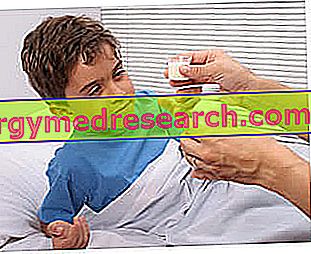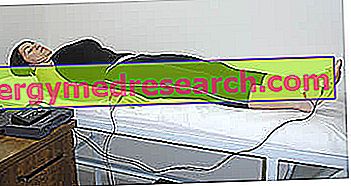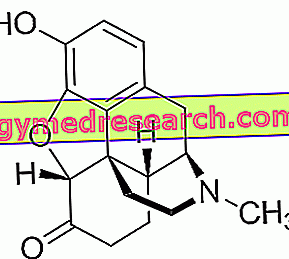What is Reye's Syndrome?
Reye's syndrome designates a severe, typically infantile, pathological picture, which essentially consists of a hepatic and cerebral inflammatory process triggered by the intake of acetylsalicylic acid (the active ingredient of aspirin).

Reye's syndrome is a potentially fatal disease, responsible for the progressive deterioration of some very important organs, to the point of causing hypoglycemia, encephalopathy, liver inflammation, coma and death. Only the early diagnosis of the syndrome seems to save the life of the child who is affected.
Causes
To date, the precise cause responsible for Reye's syndrome has not yet been identified; what is certain is that the aforementioned syndrome is heavily influenced by the administration of medicinal products based on acetylsalicylic acid (and derivatives) to children under the age of 12. However, the same morbid condition was also diagnosed in some children who did not take these active ingredients.
From the clinical evidence interesting results emerge: it seems that Reye's syndrome occurs in children who are given acetylsalicylic acid to treat influenza, respiratory infections (eg colds) or to treat chickenpox: active ingredient, in contact with the toxins of the virus, seems to enhance its therapeutic activity, creating an exaggerated damage.
Furthermore, the syndrome has often been diagnosed in children suffering from fatty acid oxidation disorders (inherited metabolic diseases - fortunately rare - in which the body is unable to dispose of fatty acids due to an enzyme deficiency).
Again, it seems that chronic exposure to herbicides, insecticides and other toxic substances may, in some way, promote Reye's syndrome, despite the fact that the triggered pathological mechanism remains still under study.
Drugs with acetylsalicylic acid
In the following, some medicines containing acetylsalicylic acid, which must not be taken by children under the age of 12 (unless otherwise indicated by the doctor):
- aspirin
- Vivin
- Ac Acet
- Alkaeffer
- Aspirinetta
- Istantal
- Salicylate
- Cardioaspirin
- Ascriptin
Symptoms
To learn more: Symptoms Reye syndrome
Recent medical statistics show that Reye's syndrome tends to appear 3-5 days after the administration of acetylsalicylic acid to children under the age of 12, suffering from flu, cold or chicken pox. Generally, in children under the age of 2 years, Reye's syndrome begins with dysentery and increases in heart rate; in older children, the most common symptoms are drowsiness and continuous vomiting. To these initial symptoms, others are added, such as hallucinations, mood alteration, decreased concentration, mental confusion, weakness, irritability and marked drowsiness. Blood analysis also shows that something is not right: glycemic levels are heavily reduced (hypoglycemia), unlike the amount of ammonia in the blood, which increases excessively over 300mg / dl (hyperammonemia). Sometimes, an hepatomegaly (enlargement of the liver), associated with convulsions, encephalopathy, epilepsy, loss of consciousness, up to coma and death can also be observed.
Adult Reye syndrome
Although the probability that Reye's syndrome occurs in adults is very rare, some cases have nevertheless been documented: in similar situations, the severity of the disease is rather low and full health recovery is normally complete and simple. In fact, it is observed that normal hepatic and cerebral functions regain full functionality within 14 days from the onset of symptoms. Different speech must be made in affected children, since the recovery of intellectual and hepatic abilities is rather complex, especially in the case of diagnostic delay.
Diagnosis
Early diagnosis of Reye's syndrome is essential to save the child's life: we are indeed talking about a medical emergency in all respects; therefore the immediate recognition of a similar pathological condition is very important.
Blood and urine tests, as well as direct medical examination, can confirm Reye's syndrome in a fairly short time. Despite the absence of a specific diagnostic test for the syndrome, the patient is sometimes subjected to more in-depth invasive controls to verify the presence of neurological dysfunctions. Among these latest medical analyzes, we recall the liver biopsy, skin biopsy (useful for testing the possibility of fatty acid oxidation disorder), lumbar puncture for obtaining a cerebrospinal fluid sample (for investigation of encephalitis or meningitis), CT and MRI.
Treatments and drugs
To learn more: Drugs for the treatment of Reye's Syndrome
In most cases, patients with Reye's syndrome are hospitalized and kept under close medical observation; the most serious patients are directed to the intensive care unit. The goal of treatment for the treatment of Reye's syndrome is to reduce the general inflammation of the internal organs and to prevent any damage, especially in the liver and brain.
Most often, the child is rehydrated with intravenous glucose and electrolyte-based fluids: remember, in fact, that hypoglycemia is a characteristic symptom of Reye's syndrome.
For the prevention of bleeding, it is possible to proceed with a treatment with vitamin K associated with an integration of plasma and platelets. Also diuretic drugs are used in therapy in the context of Reye's syndrome to decrease intracranial pressure, favoring the emission of liquids with urine. Furthermore, to remove the pathogen, it is possible to administer antibiotics (only in the case of proven bacterial co-infection). To facilitate the elimination of toxic / harmful substances from the body, the administration of laxatives with a lubricating / emollient action is very useful.
When Reye's syndrome involves the bronchial tract, causing serious breathing difficulties, it is conceivable to use an endotracheal tube.
Prevention
In order to reduce the risk of Reye's syndrome in children, it is recommended to take drugs containing paracetamol for the treatment of influenza and varicella diseases. As a precautionary measure, an active informational propaganda has been disclosed aimed at discouraging the use of acetylsalicylic acid and derivatives in children who have not completed 12-16 years of age, to minimize the possibility of Reye's syndrome.



